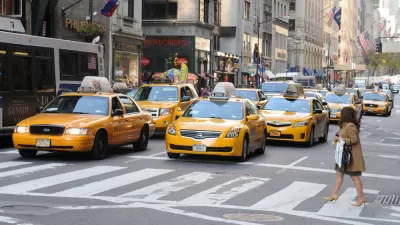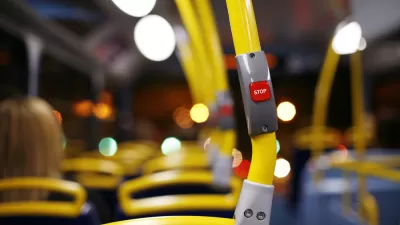A small public transit company serving the East Bay will be the first in California to conduct a pilot project to use transportation network companies and taxis to service low density areas of Dublin in Alameda County.
"One of the great, looming questions of transportation is whether transportation network companies will complement or compete with transit," wrote Planetizen editor James Brasuell last month about "a new uberPool promotion [that] suggests the ride-hailing service may be inching closer to becoming competition for public transit."
Now from the Bay Area comes a promotion for ride hailing services, including taxis for those without smartphones, not from transportation networking companies but from the public transit industry itself. Why, you might ask, would a public transit provider spend precious public funds on the private sector so as to replace or complement its own transit services?
As Christy Wegener, director of planning and communications for the Livermore Amador Valley Transit Authority (called "Wheels") tells Devin Katayama of KQED News, the Bay Area's National Public Radio station, on the audio tape. "Dublin has some 'challenging areas' to service a bus in areas of low-density development which cost the bus agency over $15 for 'big bus service.'"
To make the pilot affordable to participants, "[t]he Livermore Amador Valley Transit Authority has committed $100,000 and has submitted an application for a $100,000 grant from the Alameda County Transportation Commission, said Wegener.
"Fares would be limited to $3 for trips within West Dublin and $5 within the East Dublin project area -- much less than the typical Uber or Lyft fare but more than the $2 Wheels bus fare, according to a report to the valley transit authority," reports Denis Cuff for The Mercury News. Seniors and disabled pay $1 for fixed route service. Dial-A-Ride Paratransit fare is $3.50.
In anticipation of the partnership, Wheels on Aug. 13 eliminated its No. 3 bus route in West Dublin. The route was attracting only about five riders per hour at a public subsidy of $15 per rider, according to the report.
Union opposes pilot
"We object they are using public funds to subcontract with drivers who are independent contractors working for a company that has a bad reputation for how it treats its workers," said Teamster Local 70 spokesman Richard Fierro. "We are not opposed to them finding more cost-effective ways to provide service, but we don't think this is the way to do it."
"Dublin’s population has been one of the fastest growing in Alameda County," states Katayama. [In fact, the city of almost 50,000 in 2013 was the second-fastest growing in the state in 2012, according to the Dublin Patch.]. "Do you think that these partnerships are a long- term fix or a short-term fix to gaps in the public transportation system in the Bay Area suburbs?" he asks Wegener.
I think that it has definite long-term potential. We’re struggling with how do you provide that connectivity to your main line routes, and this is our first attempt to come up with a creative solution.
"[T]he pilot program will continue until the money runs out, which Wegener said could be in a year," adds Katayama.
To return to the original question posed by Brasuell, will TNCs complement or compete with public transit, Wegner states (at the end of the audio tape): "We don't look at this as competitive; we look at this service as a complement to our fixed bus route network."
Last year Eric Jaffe reported for CityLab on how larger cities and transit agencies are dealing with transportation network companies.
Hat tip to L.A. Metro Transportation Headlines.
FULL STORY: Pilot Program to Help Dublin Commuters Pay for Uber, Lyft, Cabs

Alabama: Trump Terminates Settlements for Black Communities Harmed By Raw Sewage
Trump deemed the landmark civil rights agreement “illegal DEI and environmental justice policy.”

Study: Maui’s Plan to Convert Vacation Rentals to Long-Term Housing Could Cause Nearly $1 Billion Economic Loss
The plan would reduce visitor accommodation by 25% resulting in 1,900 jobs lost.

Planetizen Federal Action Tracker
A weekly monitor of how Trump’s orders and actions are impacting planners and planning in America.

Wind Energy on the Rise Despite Federal Policy Reversal
The Trump administration is revoking federal support for renewable energy, but demand for new projects continues unabated.

Passengers Flock to Caltrain After Electrification
The new electric trains are running faster and more reliably, leading to strong ridership growth on the Bay Area rail system.

Texas Churches Rally Behind ‘Yes in God’s Back Yard’ Legislation
Religious leaders want the state to reduce zoning regulations to streamline leasing church-owned land to housing developers.
Urban Design for Planners 1: Software Tools
This six-course series explores essential urban design concepts using open source software and equips planners with the tools they need to participate fully in the urban design process.
Planning for Universal Design
Learn the tools for implementing Universal Design in planning regulations.
Caltrans
Smith Gee Studio
Institute for Housing and Urban Development Studies (IHS)
City of Grandview
Harvard GSD Executive Education
Toledo-Lucas County Plan Commissions
Salt Lake City
NYU Wagner Graduate School of Public Service





























